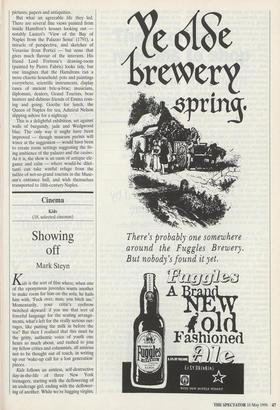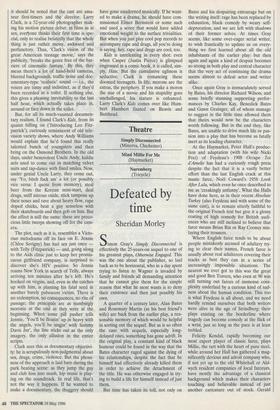Cinema
Kids (18, selected cinemas)
Showing off
Mark Steyn
ids is the sort of film where, when one of the eponymous juveniles wants another to make room for him on the sofa, he hails him with, 'Fuck over, man, you bitch ass.' Momentarily, your critic's eyebrow twitched skyward: if you use that sort of forceful language for the seating arrange- ments, what's left for the really serious out- rages, like putting the milk in before the tea? But then I realised that this must be the gritty, authentic voice of youth one hears so much about, and rushed to join my fellow critics and columnists, all anxious not to be thought out of touch, in writing up our `wake-up call for a lost generation' pieces.
Kids follows an aimless, self-destructive day-in-the-life of three New York teenagers, starting with the deflowering of an underage girl, ending with the deflower- ing of another. While we're bagging virgins, it should be noted that the cast are ama- teur first-tuners and the director, Larry Clark, is a 52-year-old photographer mak- ing his motion picture debut: in films as in sex, everyone thinks their first time is spe- cial, only to realise belatedly that the whole thing is just rather messy, awkward and perfunctory. Thus, 'Clark's vision of the great American teenage movie,' says the publicity, 'breaks the genre free of the bar- riers of cinematic fantasy.' By this, they mean there's a lot of hand-held cameras, blurred backgrounds, traffic noise and doc- umentary-type 'realistic' sound — i.e., the voices are tinny and indistinct, as if they'd been recorded in a toilet. If nothing else, this gives a pleasing inevitability to the last half hour, which actually takes place in, around or face down in the toilet.
But, for all its much-vaunted documen- tary realism, I found Clark's Kids, from its quaint billing on (Introducing Leo Fitz- patrick'), curiously reminiscent of old tele- vision variety shows, where Andy Williams would explain that he'd found this really talented bunch of youngsters and then bring on the Osmond Brothers. In the old days, under benevolent Uncle Andy, kiddie acts used to come out in matching velvet suits and tap-dance with fixed smiles. Now, under genial Uncle Larry, they come out, say 'Yo, bitch fuck ass' a lot (or possibly vice versa: I quote from memory), steal beer from the Korean mini-mart, deal drugs, sniff nitrous oxide, stick tampons up their noses and rave about heavy flow, rape doped chicks, beat a guy senseless with their skateboards and then gob on him. But the effect is still the same: these are preco- cious little twerps showing off for the cam- era.
The plot, such as it is, resembles a Victo- rian melodrama off its face on E. Jennie (Chloe Sevigny) has had sex just once with Telly (Fitzpatrick) — and, going along to the Aids clinic just to keep her promis- cuous girlfriend company, is surprised to discover she's HIV positive. So Jennie roams New York in search of Telly, always arriving ten minutes after he's left. He's hooked on virgins, and, even as she catches up with him, is planting his fatal seed in another barely pubescent victim. There is no redemption, no consequences, no rite of passage; the principals are as numbingly moronic at the end as they were at the beginning. When some pill pusher tells Jennie, 'You'll be floatin' up in heavy with the angels, you'll be singin' with Sammy Davis Jnr', the line sticks out as the only imagery, the only allusion in the entire scripts.
Clark sees this as documentary objectivi- ty: he is scrupulously non-judgmental about sex, drugs, crime, violence. But the phoni- ness of the approach is laid bare during the park beating scene: as they jump the guy and club him into mush, hip music is play- ing on the soundtrack. In real life, that's not the way it happens. If he wanted to make a documentary, the thuggery should have gone unadorned musically. If he want- ed to make a drama, he should have com- missioned Elmer Bernstein or some such and used a score that would have added emotional weight to the surface trivialities. But when you just play cool pop records to accompany rape and drugs, all you're doing is saying, hey, rape and drugs are cool, too.
Kids is unrelenting in every shot: even when Casper (Justin Pierce) is glimpsed engrossed in a comic book, it is called, sim- ply, Hate. But the cumulative ugliness is seductive: Clark is romancing these doomed teenagers. In life, morons are the extras, the periphery. If you make a moron the star of a movie and his stupidity goes unchallenged, his stature is enhanced. Larry Clark's Kids comes over like Hum- bert Humbert fixated on Beavis and Butthead.



































































 Previous page
Previous page